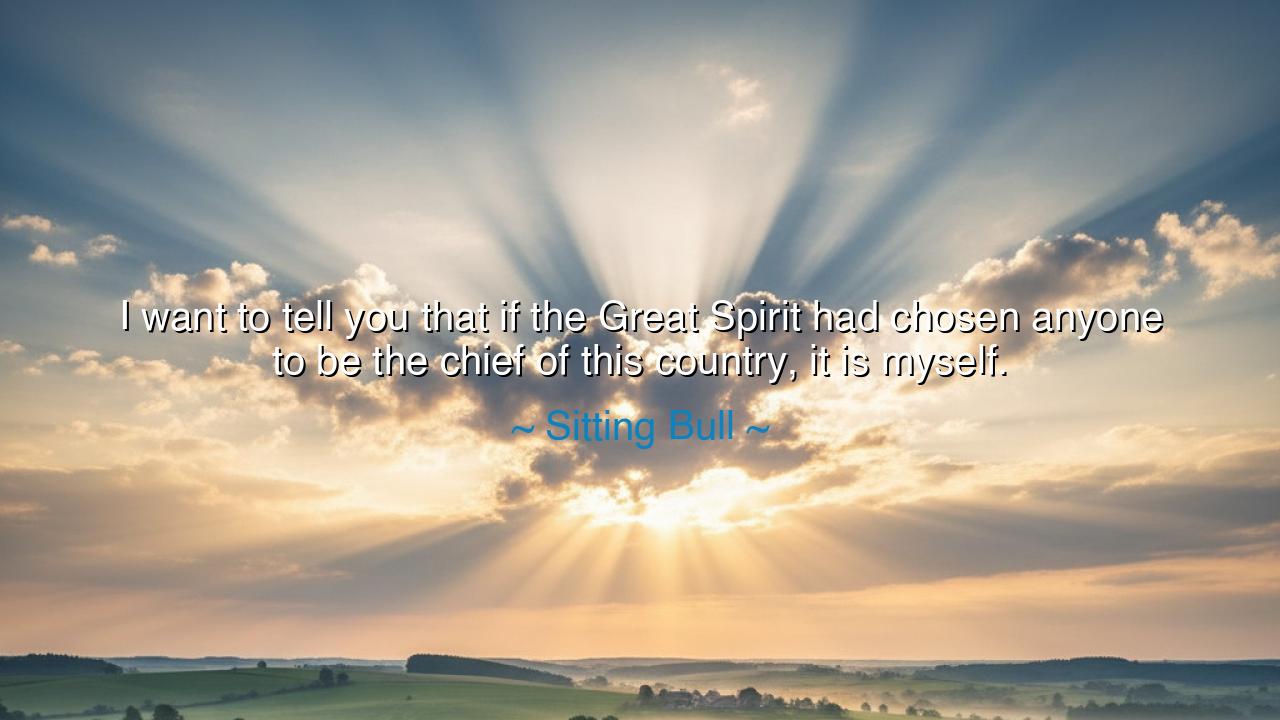
I want to tell you that if the Great Spirit had chosen anyone to
I want to tell you that if the Great Spirit had chosen anyone to be the chief of this country, it is myself.






The words of Sitting Bull—“I want to tell you that if the Great Spirit had chosen anyone to be the chief of this country, it is myself.”—resound like the voice of the earth itself, rising from the plains and the mountains, from rivers and skies. Spoken by a leader of the Lakota Sioux, these words are not born of arrogance, but of deep communion with the land and with the divine. Sitting Bull did not claim kingship in the manner of conquerors; rather, he spoke as one who felt himself chosen by the Great Spirit to defend his people, to preserve their freedom, and to remind the world that leadership is not granted by governments, but by destiny, by duty, and by the eternal bond between man and creation.
At the heart of his declaration lies the truth that legitimacy flows from the sacred, not from mere force. Sitting Bull lived in a time when the United States government sought to break the spirit of his people, to drive them from their ancestral lands, and to reduce them to submission. Against this tide of conquest, he stood like an oak, unbending, declaring that if there were to be one voice for the people of the land, it was his—not because he sought glory, but because he was chosen by the Great Spirit to guard what was holy. His words challenge us to ask: who is truly fit to lead? The one appointed by law and sword, or the one chosen by destiny and sustained by the prayers of a people?
History bears witness to his claim. Sitting Bull led his people through one of the most tumultuous periods in their existence. When treaties were broken, when land was stolen, when buffalo herds were slaughtered to starve the Sioux into submission, he stood firm. His leadership culminated in the legendary victory at the Battle of the Little Bighorn in 1876, where his vision and resolve inspired his warriors to defeat General George Armstrong Custer. It was not merely a military triumph, but a declaration: the Great Spirit had indeed placed him as guardian over his people, a chief not by title but by spirit.
Yet Sitting Bull’s greatness lay not only in battle. He was also a man of vision, known for his spiritual depth and prophetic dreams. Before Little Bighorn, he dreamed of soldiers falling into the camp like grasshoppers, and his people took it as a sign of coming victory. To his followers, this connection to the Great Spirit was proof that his leadership was divinely sanctioned. His words about being chosen must be heard in this light—not as vanity, but as testimony to a sacred calling.
The ancients would understand such a claim. For in every age, true leaders have been those who rise not through crowns or armies, but through destiny and the voice of the divine. Moses led his people out of bondage not because Pharaoh appointed him, but because God called him. Joan of Arc led France not by royal decree, but by visions that burned in her soul. Sitting Bull stands in their company: a leader who proclaimed his authority not from man, but from the Great Spirit.
The lesson for us is powerful: true leadership is not grasped, but bestowed. It is not measured by titles, possessions, or earthly power, but by faithfulness to duty, by courage in the face of injustice, and by harmony with the eternal. Sitting Bull reminds us that a nation’s chief is not necessarily the one crowned by government, but the one who rises when the people need him most, the one chosen by a power beyond human schemes.
In daily life, this means that each of us must listen for the calling of the Great Spirit within us. We may not all be chiefs of nations, but we are chiefs of our households, our communities, our work, and our paths. When injustice arises, when others falter, when truth is endangered, we must be ready to rise—not because we sought it, but because destiny and conscience demand it.
Thus let Sitting Bull’s words echo across the generations: the Great Spirit chooses leaders not for ambition, but for service. A true chief is not crowned by gold but by sacrifice, not enthroned in palaces but in the hearts of the people. And when the time comes, each of us must be ready to answer that same call—to rise, to guard, to lead with courage and with truth.






AAdministratorAdministrator
Welcome, honored guests. Please leave a comment, we will respond soon